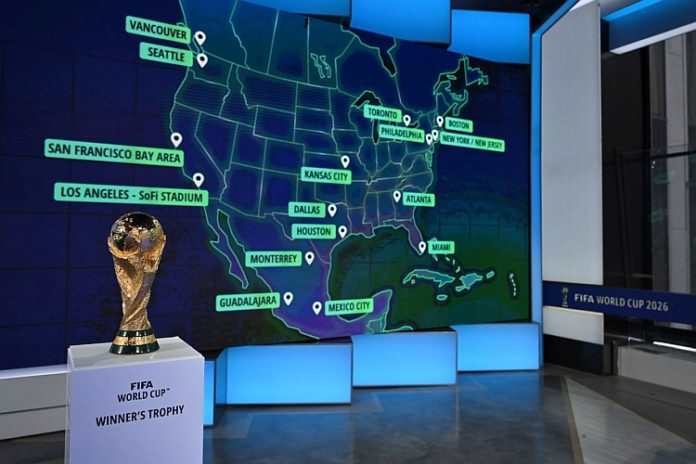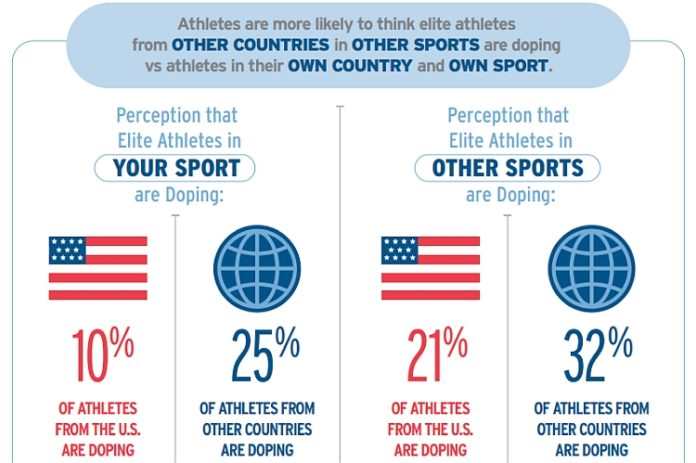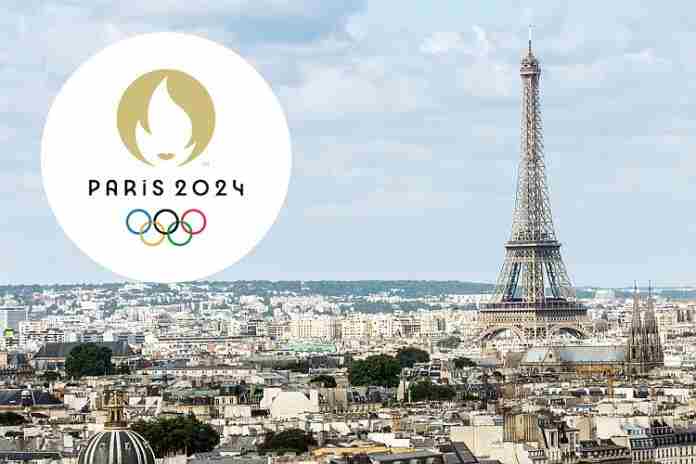★ The Sports Examiner: Chronicling the key competitive, economic and political forces shaping elite sport and the Olympic Movement.★
★ To get The Sports Examiner by e-mail: sign up here! ★
≡ THE 5-RING CIRCUS ≡
1. FIFA to approve mammoth, 104-match World Cup for 2026
2. WADA chief Banka asks for stronger anti-doping treaty
3. Russia confirmed as still non-compliant with WADA Code
4. Activists asking vote on 2030 Commonwealth Games in Alberta
5. U.S. Swimmers offered $1 million bonus to sweep Paris relays
The FIFA Council approved a format of 12 groups of four for the 2026 World Cup, which will expand the tournament from 64 in Qatar to a staggering 104 matches in Canada, Mexico and the U.S.! At the World Anti-Doping Agency Annual Symposium, President Witold Banka of Poland urged a revision of the UNESCO anti-doping treaty that would allow sanctions against countries, just as sanctions are now leveled at athletes. Moreover, he specifically noted that the Russian Anti-Doping Agency is not yet compliant, even with the Court of Arbitration for Sport sanctions expiring at the end of last year, and pointed to the Kamila Valieva doping case from the Beijing 2022 Winter Games as a problem. In the Canadian province of Alberta, activists are asking why the hosting – and cost – of a 2030 Commonwealth Games in Calgary and Edmonton would be a good idea, with one group starting a petition to ask for a referendum on the project … which is currently only in the exploratory stage. USA Swimming wants to improve its relays performance at the World Championships and Olympic Games and announced a $500,000 bonus for the swimming and open-water team if the U.S. wins all seven Olympic-program relays at the 2023 Worlds and $1 million for a sweep at Paris 2024!
● Panorama: Aquatics (Phelps leads 2023 Hall of Fame Class) = Athletics (Goucher says she blew the whistle on Salazar) = Badminton (USA Badminton pays $1 million to settle harassment claim) = Baseball (2: Dominicans one-hit Israel, 10-0, in World Baseball Classic; good TV audiences so far) = Basketball (Hill says U.S. World Cup team forming) = Biathlon (Roeiseland and Herrmann-Wick retiring) = Boxing (Kremlev rips Women’s Worlds boycotters) = Gymnastics (Verniaiev suspension ends early) = Water Polo (Italy and Spain win men’s World Cup groups) ●
1.
FIFA to approve mammoth, 104-match World Cup for 2026
There will be no doubt that the 2026 FIFA World Cup in Canada, Mexico and the U.S. will be the biggest ever … by far.
The FIFA Council, meeting in advance of the FIFA Congress in Kigali, Rwanda, approved the international match calendar for 2025-30, clearing a 56-day period for players to join national teams, play in the 2026 World Cup and then return, back to the same schedule as for 2010, 2014 and 2018.
With the number of teams expanding from 32 to 48 for 2026, it was originally thought that the group stage would feature 16 groups of three teams. But after the brilliant group stage at Qatar 2022, the format reverted to the familiar four-team groups – 12 now needed – and the final games of each group played concurrently to help alleviate collusion. This also ensures that all teams play at each three matches.
With the added teams, the 2026 tournament will expand by 62.5%, from 64 matches to 104 and establish all-new records for attendance, world viewership and revenues. Suddenly, the $11 billion revenue target for the 2023-26 quadrennial seems achievable.
The World Cup Final is now scheduled for 19 July, with the opening on 11 June – 39 days in all – and with the top two teams from each of the 12 groups advancing, plus eight of the 12 third-place teams, into a new round of 32. The tournament will be played at 16 already-selected sites, with three in Mexico, two in Canada and the other 11 in the U.S.
A new FIFA club competition is also to debut in 2024 to match up the winners of the continental confederation championships. A 32-team FIFA Club World Cup will begin in 2025.
The 73rd FIFA Congress in Kigali will take place on Thursday (16th), with Gianni Infantino (SUI) standing unopposed for re-election as President.
2.
WADA chief Banka asks for stronger anti-doping treaty
“The Convention does not have an effective enforcement mechanism so violating it has virtually no consequences. Even Russia has remained a compliant state party despite WADA revealing an extensive institutionalized doping program in that country and despite the Court of Arbitration for Sport acknowledging the active role of the Russian Government in the doping scandal. How is this possible? UNESCO must hold resistant Governments to account and protect other Governments and their athletes from those who violate the rules.”
That’s World Anti-Doping Agency President Witold Banka (POL) from his keynote address at the WADA Annual Symposium in Lausanne, urging a toughening of the United Nations Education Science and Culture Organization’s 2005 International Convention Against Doping in Sport.
The goal is to “hold to account” governments with weak anti-doping policies, just like athletes are subject to sanctions under the World Anti-Doping Code:
“Again and again, I have been told by athletes: ‘We want everyone involved in anti-doping to be held to the same standards as we are.’ That means Anti-Doping Organizations, coaches, doctors and WADA accredited laboratories. All these groups are held accountable by the World Anti-Doping Program… whether it is through the World Anti-Doping Code, WADA’s robust compliance monitoring program or stringent lab assessments.
“That leaves Governments, at least the ones that are apathetic or resistant. This is where we need to do much more. The importance of Governments in anti-doping cannot be overstated. Through legislation, policies, regulations, administrative practices and funding, they can take actions that are not available to the Sport Movement or to WADA. Governments can, in particular, restrict the availability or use of doping substances, increase border controls and fund Anti-Doping
Organizations. …
“Recently, I was at a meeting of senior Government officials where one Sports Minister was very vocal that his nation was compliant with the UNESCO Convention. I did not find this Minister’s intervention very convincing. So, I did a little research. What did I find? Let me put it this way… how many antidoping tests did this country carry out in 2022? The answer: Zero. How much education? Zero. How many investigations? Zero. So, the question is, how can a country be compliant with the UNESCO Convention if it does nothing in these important areas? How is that possible? While a [National Anti-Doping Organization] or National Olympic Committee acting as a NADO is held accountable through the Code, there is not much it can do if a government does not respect the Convention or does not provide adequate funding.”
Banka also noted that the WADA budget is now at an all-time high of $50.2 million and that $4.5 million in research grants will be distributed in 2023, 2024 and 2025. But he is looking for more:
“Governments and the Sport Movement cannot be expected to shoulder the financial
responsibility alone. To help address this situation, we are actively seeking national, continental and global partnerships. Last year, we announced our first such partnership. I am happy to say we hope to have more good news to reveal in the coming weeks.”
The first sponsorship agreement was signed in April 2022 with the Africa-based broadcaster SuperSport.
3.
Russia confirmed as still non-compliant with WADA Code
Banka went into some detail on the status of Russia, leaving no doubt of his view:
“I would like to provide a clear update on Russia and the status of the Russian Anti-Doping Agency, RUSADA. First, I reiterate our support for the people – and, in particular, the athletes – of Ukraine in face of this continued Russian aggression. We stand – and will continue to stand – with Ukraine.
“Meanwhile, RUSADA remains non-compliant. That is related to the 2020 decision by the Court of Arbitration for Sport to declare RUSADA non-compliant and implement a number of consequences on Russian sport for a period of two years. We wanted four years and tougher consequences. Unfortunately, we didn’t get that.
“RUSADA will remain non-compliant until it fulfills each of the reinstatement conditions in full as laid out by CAS and until we have been able to verify that. We will continue to follow the agreed process. However, I must say that trust in the independence of the anti-doping system there remains very low. For example, the way the case of the [Russian] figure skater Kamila Valieva has been dealt with, has not been encouraging.
“The unnecessary delays in the case feed that distrust. Moreover, we have seen the coach in question [Eteri Tutberidze] receive awards from the highest office in the land. So much for the protection of young athletes, of children! We believe the first instance decision by RUSADA’s disciplinary tribunal is wrong. That is why WADA has appealed it to CAS.
“That decision raises questions as to the competence of their national hearing panel. It certainly does not build confidence. This is something we will continue to take very seriously.”
Banks also noted that the continuing data mining and sample testing from the infamous Moscow Laboratory information system (LIMS) from 2019 has yielded 181 sanctions against Russian athletes, 88 who have been charged with a doping offense and 212 cases that continue to be evaluated.
As far as the Valieva case is concerned, WADA Director General Olivier Niggli (SUI) told reporters:
“It is very difficult now to predict how long it will take, because many different factors affect the case, in particular, how the lawyers of the athlete will conduct the case.
“We would like to do everything possible to get the case resolved as quickly as possible. But the case is very complex, it combines three appeals. I would be very optimistic if I said that we will get a decision before the end of the year, there are still many unknown factors in the case now.”
Russian Anti-Doping Agency Director General Viktoria Loginova told the Russian news agency TASS:
“[I]n order to ensure independence, we are taking exhaustive measures that the World Anti-Doping Code and other WADA documents prescribe for us. Unfortunately, we hear such statements [from WADA] not for the first time. I hope this does not greatly demotivate our team, which, despite the huge number restrictions and difficulties, performs its work at a high level and in full compliance with international standards.”
4.
Activists asking vote on 2030 Commonwealth Games in Alberta
“People are struggling to put food on the table and pay their electricity bills, and the government, whether that be provincial or municipal, is now thinking about spending billions of dollars on what is essentially a big party.”
A familiar refrain from Peter McCaffrey of the Alberta Institute last week, initiating a push-back against the newly-announced study of a possible bid for the 2030 Commonwealth Games, primarily in Calgary and Edmonton.
The Canadian Taxpayers Federation has an online petition up, asking for signatures to demand a referendum in the province on the bid, prior to any money being spent on it.
There’s no bid yet, no budget, but more details are expected by the summer, with a possible award of the 2030 host from the Commonwealth Games Foundation as early as the end of the year.
In 2018, a potential Calgary bid for the 2026 Olympic Winter Games was defeated in a citywide referendum with more than 56% voting against it. Calgary very successfully hosted the 1988 Winter Games and Edmonton hosted the 1978 Commonwealth Games.
Commonwealth Games bids are quite interesting now since the requirements only specify that two sports must be held: athletics and swimming. The rest of the program is up to the bidder; in this century, the number of sports has been as low as 16 (in 2006: Melbourne) with 21 expected in Australia (Victoria) in 2026. The last Commonwealth Games in Canada was in Victoria (B.C.), in 1994.
5.
U.S. Swimmers offered $1 million bonus to sweep Paris relays
The American relay performance at the Olympic Games and World Championships has been good, but not great in recent seasons, so USA Swimming is trying to do something about it.
Bonus money:
At the 2023 World Championships:
● $500,000 for the pool and open-water swimmers to win all seven Olympic relays.
● $150,000 for a medal in all seven.
At the 2024 Olympic Games:
● $1,000,000 for the pool and open-water swimmers to win all seven relays.
● $250,000 for a medal in all seven.
The events include the 4×100 m Freestyle relay for men and women, 4×200 Free relay for men and women, the 4×100 m Medley relay for men and women and the 4×100 m Mixed Free relay.
Said Lindsay Mintenko, the USA Swimming National Team Managing Director:
“This is an unprecedented incentive program with the ultimate goal of extraordinary relay success. While many might see swimming as an individual sport, we at USA Swimming know that a team focus is the very core of our success. We have a proud tradition in Olympic and World Championship relays, and we hope to foster that culture and camaraderie in the next wave of athletes.”
At Tokyo in 2021, the U.S. won both men’s 4x100s, was fourth in the men’s 4×200 Free, won silvers in the 4×200 m Free and 4×100 m Medley and was third in the women’s 4×100 m Free. No bonus.
At the 2022 World Championships, the U.S. won five of seven – men’s 4×100 m Free, men’s 4×200 m Free, women’s 4×200 m Free and 4×100 m Medley, and the Mixed Relay, plus a silver in the men’s 4×100 m Medley and bronze in the women’s 4×100 m Free. A repeat in 2023 will be worth $150,000, split among the entire team.
≡ PANORAMA ≡
● Aquatics ● The International Swimming Hall of Fame announced its Class of 2023 on Tuesday, led by the greatest swimmer in history, American Michael Phelps.
The induction ceremony on 30 September in Ft. Lauderdale will include 13 new members, from eight countries:
● Swimming: Cesar Cielo (BRA)
● Swimming: Kirsty Coventry (ZIM)
● Swimming: Missy Franklin (USA)
● Swimming: Kosuke Kitajima (JPN)
● Swimming: Michael Phelps (USA)
● Artistic: Natalia Ischenko (RUS)
● Diving: Minxia Wu (CHN)
● Water Polo: Heather Petri (USA)
● Open Water: Stephane LeCat (FRA)
● Coach: Bob Bowman (USA, swimming)
● Coach: Chris Carver (USA, artistic)
● Contributor: Sam Ramsamy (RSA)
● Paralympian: Trischa Zorn (USA).
Cielo was a supreme sprinter, setting two world marks and winning the 50 m Freestyle at Beijing 2008 and bronzes in the 100 m Free in 2008 and the 50 m Free in 2012. Coventry won eight Olympic medals (2-4-2) across five Olympic Games from 2000-16 in the Backstroke and Medleys (all in 2004 and ‘08). Backstroke star Franklin won five Olympic medals (4-1-0) and 11 Worlds golds. Kitajima set seven world records and doubled in the 100 and 200 m Breaststroke events in Athens 2004 and Beijing 2008. Phelps won 28 Olympic medals, the most ever, including 23 golds and set an astonishing 39 world records.
Ishchenko was a five-time Olympic champion and 19-time Worlds winner, from 2005-16, in Solo, Duet and Team events. Wu won five Olympic golds in 2004-08-12 and eight Worlds golds in Springboard diving. Petri was a key member of the 2012 Olympic champs, silver medalist in 2008 and 2020 and on the 2004 bronze-medal team. Lecat was the FINA World Cup Series winner three times, in 1997-99-2000.
Bowman coached Phelps and was an assistant U.S. Olympic coach in 2004-08-12 before serving as head coach in 2016. Carver was a renowned artistic swimming choreographer and guided the U.S. team to the 1996 Olympic Team gold.
Ramsamy was a key figure in isolating South Africa’s apartheid regime in sports, then becoming one of its leaders after integration in the 1990s. He continues to serve as the First Vice President of World Aquatics.
Zorn, who is blind, has won an amazing 55 medals, including 41 golds, in Paralympic Games competition, beginning in 1980.
● Athletics ● U.S. distance star Kara Goucher told ABC’s “Good Morning America” that she was the person who informed the U.S. Center for SafeSport about two incidents of “inappropriate touching” during massages by then-Oregon Project coach Alberto Salazar and that the allegations eventually led to his lifetime ban.
Goucher, 44, a two-time Olympian in 2008 and 2012 and the 2007 World Championships silver medalist at 10,000 m, appeared to promote her memoir, The Longest Race: Inside the Secret World of Abuse, Doping, and Deception on Nike’s Elite Running Team.
Salazar was suspended by the U.S. Anti-Doping Agency in 2019 and then banned for life by SafeSport in 2021. He said in a statement:
“Any claim that Ms. Goucher was sexually assaulted by me is categorically untrue. I am deeply saddened by Ms. Goucher’s false claim. I worked with Ms. Goucher as her coach for nearly seven years, from October 2004 to September 2011, when Ms. Goucher was 26 to 33 years old. We had a strong professional relationship, and Ms. Goucher and her husband became friends with my wife and family during the time we worked together. Ms. Goucher achieved a number of professional successes during my coaching of her, but when I became unable to provide the coaching and support that Ms. Goucher needed to achieve her goals, Ms. Goucher left and retained another coach. I have never sexually assaulted Ms. Goucher and never would have done so.”
● Badminton ● ESPN and ABC News reported that USA Badminton “secretly paid $1 million to settle a dispute with a former employee who says he was terminated in retaliation for reporting allegations of sexual abuse by a prominent coach.”
The agreement, from January of this year, paid former federation senior staff member compliance officer Alistair Casey after he alleged that he was harassed and fired in 2021 for reporting old allegations of sexual abuse within the sport to the U.S. Center for SafeSport.
It’s worth noting that USA Badminton’s 2021 financial statements – the last publicly available – showed the federation with less than $366,000 in assets and cash-on-hand of $351,542. It had total revenues of $552,485 for the year, and did not note any significant future events “that would require recognition in the financial statements or disclosure in the related notes to the financial statements.”
That would make a $1 million payout truly extraordinary and perhaps covered by insurance, against a potentially even greater liability in a trial.
● Baseball ● The next-to-last day of competition in the two U.S.-based pools in the World Baseball Classic saw tournament favorite Dominican Republic get back into contention for the quarterfinals with a 10-0 win over Israel in a seven-inning game due to the 10-run rule.
Third baseman Manny Machado hit a third-inning home run and drive in three runs for the Dominicans, who are now 2-1 and will play Puerto Rico (2-1) on Wednesday for the right to advance to the quarterfinals. Venezuela is atop Pool D in Miami with a 3-0 mark and will play 1-2 Israel, which was shut out for the second straight game, this time with one hit, after being held to none on Monday against Puerto Rico. Nicaragua lost to Venezuela, 4-1, and will finish last in the group at 0-4.
In Pool C in Phoenix, the U.S. had the day off after pummeling Canada, 12-1, to move to 2-1. The Canadians bounced back to beat Colombia, 5-0, and are also 2-1 with Colombia at 1-2.
Great Britain (1-3), seen as the weakest team in the group coming in, battled Mexico (2-1) to a 1-1 tie through six innings in the nightcap, but catcher Alexis Wilson singled in shortstop Alan Trejo in the bottom of the seventh for a 2-1 lead and that’s the way it ended. The pool will be decided on Wednesday as Canada faces Mexico and the U.S. plays Colombia.
¶
Television audiences for the Classic have been pretty good, with last Saturday night’s U.S.-Great Britain game drawing 1.479 million on FOX. The Saturday day game between Mexico and Colombia on FS1 drew 758,000 and Sunday evening’s U.S.-Mexico match-up had an average of 791,000 viewers. The Sunday early-evening game with Venezuela and Puerto Rico drew 599,000, the only other game above the half-million mark.
● Basketball ● The U.S. men had a tough time at the 2019 FIBA World Cup in Australia, qualifying for the Tokyo Olympic Games, but finishing seventh after a quarterfinal loss to France, its worst finish ever.
The American team schedule is now set for 2023, with USA Basketball men’s National Team Managing Director Grant Hill telling reporters on Monday that exhibition games have been set for Malaga (ESP) against Slovenia (12 August) and Spain (13 August), and in Abu Dhabi (UAE) on 18 and 20 August against Greece and Germany. The U.S. will open World Cup play in the Philippines on 25 August.
As to the players, Hill explained:
“I understood when taking this job that it would be challenging and certainly not ceremonial at all.
“There’s a tremendous amount respect for the international game and certainly a lot of work that that goes into giving ourselves a chance to win gold. The expectations are tremendous. Anything less than gold is looked upon as a failure. I’m aware of that. But I love the challenge. …
“Players have been very, very receptive. I think in recent weeks, we’ve started to intensify that and looking to really get some momentum there and some commitments, possibly, here in the stretch run going into the [NBA] playoffs.”
A member of five USA Basketball national teams, Hill expects to have the roster finalized by late June or early July. The World Cup draw is on 29 April.
● Biathlon ● Norway’s Marte Olsbu Roeiseland and Germany’s Denise Hermann-Wick both announced their retirements on Tuesday, in advance of this week’s final World Cup stop in Oslo (NOR).
Roeiseland, 32, was the 2021-22 overall World Cup champion and won a staggering 17 World Championships medals (13-0-4) from 2016-23; 11 of her golds were on relays. She won seven Olympic medals (3-2-2), including golds in Beijing in 2022 in the 7.5 km Sprint, 10 km Pursuit and the Mixed Relay. Going into this weekend’s events, she also owns 19 World Cup victories.
Herrmann-Wick, 34, won the Beijing 15 km Individual race and a bronze in the 4×6 km Relay. She owns nine World Championships medals (2-6-1), including a 2019 victory in the 10 km Pursuit and a 2023 win in the 7.5 km Sprint. She owns 11 World Cup wins in biathlon.
She changed sports after being a cross-country skier from 2009-17, winning an Olympic relay bronze in Sochi in 2014 and taking six World Cup medals (0-3-3). Given her success in biathlon, she made an informed choice!
● Boxing ● The International Boxing Association’s Women’s World Championships begin in New Delhi (IND) on Wednesday, with 65 countries – down from 77 initially expected – sending more than 300 boxers, competing for a prize purse of $2.4 million.
IBA President Umar Kremlev (RUS) didn’t miss an opportunity to taunt those countries who are boycotting the event in protest for how the IBA has been operated and its expanding issues with the International Olympic Committee, including its continued place on the Olympic program:
“We, as the International Boxing Association, are defending our independence, we don’t need to be dictated to, we will figure it out ourselves. We call for getting rid of those people who are trying to destroy the culture of sports that has been prepared and created for hundreds of years. Those people who are trying to destroy it do not exist; these jackals are not here.
“Boxers from those countries that did not come to the World Boxing Championship would like to participate, but officials prevented them. We provided all athletes with the opportunity; it is clear that all athletes want this. But there are some, as they say, sports officials who are politicians who blocked the arrival of athletes.”
● Gymnastics ● A break for Ukraine, as two-time Olympian and Rio 2016 Parallel Bars gold medalist Oleg Verniaiev had his doping suspension for Meldonium cut from four years to two years, allowing him to compete again immediately.
The Court of Arbitration for Sport announced Tuesday that after being suspended as of 5 November 2020 from a positive from an out-of-competition test, Verniaiev’s appeal was granted in part, based on his claim that the doping finding came as a result of contaminated food products. But now:
“[T]he Panel deliberated and concluded that while the [adverse doping finding] was upheld there was grounds for a reduction in the period of ineligibility from four years to two years. Accordingly, the Athlete was subject to a two-year period of ineligibility starting on 5 November 2020 which has now concluded.”
Verniaiev missed the Tokyo 2020 Games as a result of the suspension, but is now eligible to compete in Paris.
● Water Polo ● Play concluded at the World Aquatics men’s World Cup in Division I in Croatia and Montenegro, with Italy and Spain winning the team titles.
In Group A, Italy finished with a 16-10 win over the U.S. and a 5-0 record (17 points). The next three teams – the U.S., Hungary and Croatia – all finished 3-2, but the U.S. was classified second and Hungary third on the tie-breakers. Italy, the U.S. and Hungary advance to the Super Final to be held in Los Angeles in June.
In Group B, Spain was the winner at 4-1, with Greece second (3-2), followed by Serbia (3-2) and Montenegro (3-2). The top three advanced to the Super Final.
¶
You can receive our exclusive TSX Report by e-mail by clicking here. You can also refer a friend by clicking here, and can donate here to keep this site going.
For our updated, 929-event International Sports Calendar for 2023 and beyond, by date and by sport, click here!




















